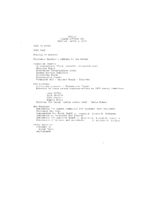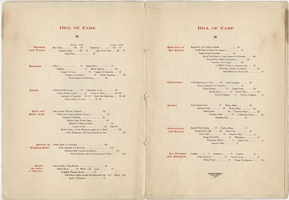Search the Special Collections and Archives Portal
Search Results

Interview with Peter Ediger, June 24, 2005
Date
Archival Collection
Description
Text

Interview with Duane L. Lawrence, June 24, 2004
Date
Archival Collection
Description
Text

Transcript of Interview with Merna Dennison by Ken Pyatt, March 1, 1980
Date
Archival Collection
Description
Text

Meeting minutes for Consolidated Student Senate, University of Nevada, Las Vegas, March 5, 1974
Date
Archival Collection
Description
Text
Rodney Sumpter Papers on Doe v. Bryan
Identifier
Abstract
The Rodney Sumpter Papers on Doe v. Bryan contain the legal files of the lawyer Rodney Sumpter, who represented the appellants in the Nevada District Court case Doe v. Bryan (1985) and subsequent appeal in the Nevada State Supreme Court in 1986. Doe v. Bryan challenged one of Nevada's sodomy laws (NRS 201.190), and the collection contains affidavits, motion requests, correspondence, newspaper clippings, and memoranda regarding the case.
Archival Collection
Perry Kaufman Papers
Identifier
Abstract
The Perry Kaufman Papers (1930-1974) are comprised of research material gathered by Kaufman for his doctoral dissertation, "The Best City of Them All: A History of Las Vegas, 1930-1960." Kaufman's research focused on the Las Vegas, Nevada Chamber of Commerce's role in promoting Las Vegas as a tourist destination. The collection primarily consists of newspaper clippings from the
Archival Collection
Ken Hanlon Jazz Music Manuscripts
Identifier
Abstract
The Ken Hanlon Jazz Music Manuscripts (approximately 1975-1990) is comprised of jazz music compositions that were gathered by the Arnold Shaw Popular Music Research Center at the University of Nevada, Las Vegas (UNLV) in Las Vegas, Nevada. The collection includes several scores and arrangements from Hanlon's ensembles, including the UNLV Jazz Band, Seventy-Six Trombones Ensemble, and the Si Zentner Ensemble.
Archival Collection
UNLV Libraries Collection of Mandalay Bay Resort and Casino Promotional Materials and Reports
Identifier
Abstract
UNLV Libraries Collection of Mandalay Bay Resort and Casino Promotional Materials and Reports includes annual reports, equity research reports, Securities and Exchange Commission Form 10-K, Securities and Exchange Commission Form 10-Q, press kits, press releases, and promotional materials for Mandalay Bay Resort and Casino in Las Vegas, Nevada, dating from 1996 to 2006.
Archival Collection
Maureen Mackey Papers
Identifier
Abstract
This collection is comprised of personal papers and photographs of Reverend Maureen E. Mackey, M.D., physiatrist and co-founder of Rainbow Praise Church in Las Vegas, Nevada. The collection contents span the dates of 1922 to 2014 and details Dr. Mackey's life, including her educational accomplishments, personal life, and religious life. This collection also contains personal papers and photographs of Dr. Mackey's twin brother, Thomas Mackey, III, who passed away from AIDS in 1992. This collection also contains various photographs of Dr. Mackey's parents and family.
Archival Collection

